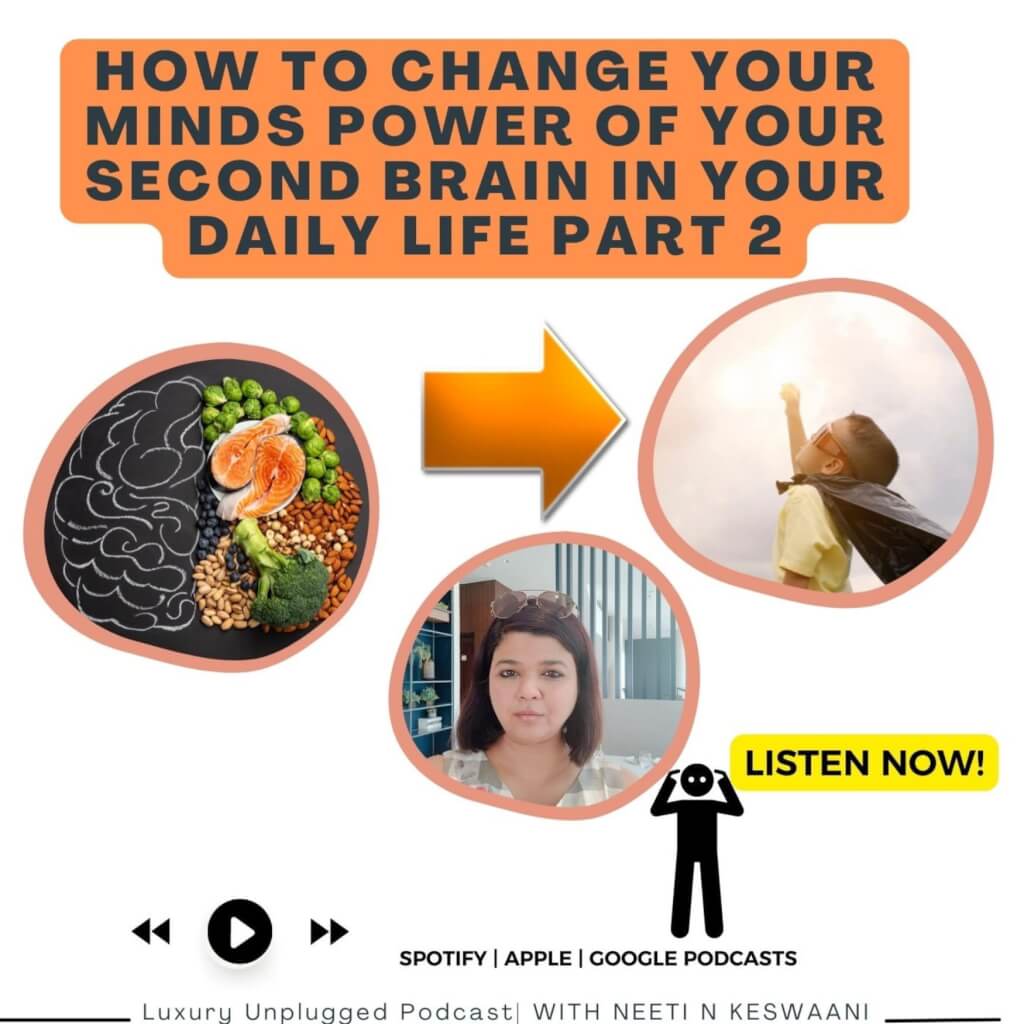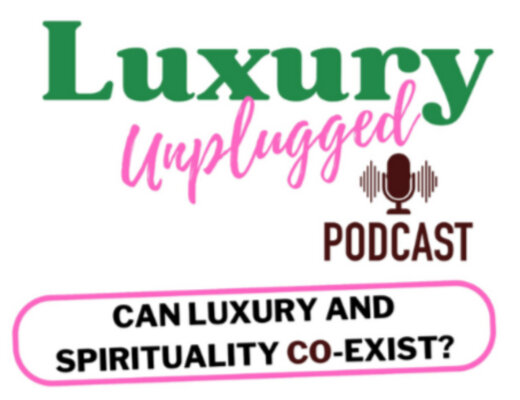Ever wonder why you feel bloated after eating a big meal or why you sometimes get butterflies in your stomach before a big presentation? It’s all thanks to the gut-brain connection! You see, our digestive system is home to millions of neurons or brain cells. In fact, some researchers believe that the gut is actually the body’s second brain. And just like our brain, the gut is responsible for producing important hormones and neurotransmitters that regulate our mood and overall health.
Well did you know, that serotonin, the “happy hormone,” is primarily produced in the gut?
So it’s no surprise that a healthy gut is essential for maintaining good mental health. In fact, studies have shown that people with gastrointestinal disorders like irritable bowel syndrome are more likely to suffer from depression and anxiety.
Now that’s something to think about next time you reach for a bag of chips!
- In this podcast, we will discuss:
- why do you feel bloated after eating a big meal?
- What is the Gut-Brain Connection?
- Role of Happy hormone
- Habits to enhance your productivity by taking care of your gut
You may not realize it, but your gut is actually one of the most important organs in your body. Not only does it play a key role in digestion, but it also has a direct connection to your brain. In fact, recent studies have shown that the health of your gut can have a significant impact on your mood and overall sense of well-being.
The good news is that there are things you can do to improve the health of your gut and, as a result, improve your overall sense of self-worth and self-confidence. Eating a healthy diet rich in fiber and probiotics is a good place to start. You can also take supplements specifically designed to support digestive health. By taking care of your gut, you’ll be surprised at how much better you feel both physically and mentally.
So, How do you make a decision based on your gut?
Listen to this podcast episode right here if you are looking for:
- Gut And Brain Are Talking To Each Other
- Our Health Begins In Digestive System
- Your Body Is Connected With Your Mind Through Digestive System
- What’s Causing Your Belly Fat? Fix This NOW Or Else… (The Ultimate Truth About Bloating)- Written by a nutritionist who specializes in digestive disorders.
- Don’t Let Digestive Problems Hold You Back From Losing Weight and Feeling Great
So, How do you make a decision based on your gut? Listen to Luxury Unplugged Podcast here:
Intuition is that feeling you get in your gut when you know something is right or wrong. It’s a sixth sense, or a hunch. You just know it deep down. Intuition can give you faith in what you’re doing.
The old saying “trust your gut” refers to trusting these feelings of intuition, often as a way to stay true to yourself.
Or it’s that moment when you sense kindness, or fear, in another’s face. You don’t know why you feel that way; it’s just a hunch.
But what is it? After all, researchers can’t see it in the brain.
Let me walk you through a Fine Example of someone using their Gut feeling and saving Millions of dollars…
In 1983, Gianfranco Becchina had a rare sixth-century sculpture for sale with a staggering $10 million price tag. The Getty Museum, having reviewed X-rays, expert testimony, and historical documentation, agreed to its purchase amid considerable media hype.
However, when Evelyn Harrison, a renowned expert on Greek sculptures, and Thomas Hoving, former director of the Metropolitan Museum of Art, arrived to admire the statue, they knew, intuitively, something was wrong.
According to Hoving, it seemed “fresh,” which was unexpected as the 2,000-year-old statue had been taken out of the ground.
And they were right. While the sculpture was from a workshop in Rome, it originated from a forger in 1980, rather than a master sculptor from antiquity (Gladwell, 2005).
So, what is intuition?
Is it that moment when you sense kindness, or fear, in another’s face. You don’t know why you feel that way; it’s just a hunch.
But what is it? After all, researchers can’t see it in the brain.
Signs of a gut feeling
- a flash of clarity
- Tension or tightness in your body
- Goosebumps or prickling
- Stomach “butterflies” or nausea
- a sinking sensation in the pit of your stomach
- Sweaty palms or feet
- Thoughts that keep returning to a specific person or situation
- Feelings of peace, safety, or happiness (after making a decision)
Now the next piece is inspired by Laura Huang‘s piece on Harvard Business Review. She is an associate professor of business administration at Harvard Business School. She is the author of Edge: Turning Adversity into Advantage. You can follow her on Twitter @laurahuangLA
She says, First, identify the type of problem you are facing. What decision are you trying to make? How much do you know about what will happen? Use your intuition for decisions that go beyond what you can predict by looking at numbers and data. For example, when deciding whether or not to divest a business, there will be a lot of things you can’t predict, such as what the market will be like in five years.
You’ll likely do research on the addressable market and competitor products but your analysis will not guarantee that people will buy the product.
This is the kind of decision where after looking at the analysis, a leader might rely on gut feel to make the call, knowing that there will never be enough information to make a fully data-based decision.
Second, be aware of the context in which you are making your decision. If you are in an environment where successful mental models and schemas have already been developed and proven, focus on method and execution.
If you’re looking for a unique, distinctive “diamond in the rough” way to set yourself apart from others who are making similar decisions (think about attempting to predict the next startup unicorn), gut feel can be beneficial.
Once you’ve decided to rely on your intuition to make a high-risk, high-impact decision, don’t try to explain it or justify to others how you arrived at it.
She tracked data for 90 different companies that people were thinking of investing in. She followed them for a few years to see if the people’s gut feelings were accurate about which companies would be most successful.
She learned that people who make successful decisions based on their gut feelings usually do the following:
- Recognize that their intuition is not a separate piece of information, but is based on objective and subjective information that is already available.
- Understand that intuition is not quick, impulsive, and emotional — it’s actually something much more cultivated and nuanced and based on experience.
- Commit to continually cultivating their intuition by paying attention to the world around them, practising social and emotional intelligence, and learning from their mistakes.
So there you have it. The next time you’re making a decision, big or small, don’t second guess that gut feeling — go with it! After all, it might just be your second brain trying to tell you something.
Before deciding on whether to trust your gut feel, it’s important to do two things.
How to Develop Your Intuition: listen to this podcast in detail
- Tune Into Your Body When you are making a decision, pay attention to how it makes you feel. Our physical reactions can often tell us what we want. Your body gives you clues when you’re faced with a big decision. There are many visible and obvious symptoms that we feel in uncomfortable situations. Our body’s reaction is often something that we might try to hide, for example, blushing, being lost for words, or shaking. Ask yourself what’s really going on here, What can your reaction or instinct teach you? Understanding that can be a clue and can help you either learn something about yourself, the situation, or other people. The answers are often within us.
3. Ensure Your Head Is Clear Before Making a Decision
Energy, sleep, and good nutrition are so vital to nourishing our minds, as well as our bodies. There are times when your instinct could lead you astray, and one of these is when you are hungry and angry, tired, or anxious. If this is the case–and it may sound obvious–do consider sleeping or eating on it before making an important choice.
- There is, in fact, a connection between our gut and our brain, which is where terms like “butterflies in the stomach” and “gut-wrenching” originate from. Stress and emotions can cause physical feelings, and ignoring them might do more harm than good.
- When it comes to using our second brain, sometimes we just need to slow down, pay attention and trust our gut instinct. Our second brain is powerful and can help us make better decisions when it comes to our health and well-being.
4. Don’t Be Afraid to Feel
Listening to your gut and really paying attention to it might involve standing up and being counted, calling something out, or taking a stand.
As they tell you in the planes, “put your own oxygen mask on first,” and part of that self-reliance is knowing what you really want and like and what is safe and good for you, including what resonates with your personal and business values. Making good decisions with this in mind means making choices that do not go against your own beliefs, even when it may mean taking a stand. This is part of trusting yourself and trusting your instincts.
Taking the “safe” path does not always imply doing so, but preserving ourselves is an essential step in the process. This is how we learn and grow, by following our own inner compass. When you take chances, step outside of your comfort zone, or opt for the less popular choice, it’s good to spend some time researching the facts.
5. Do Your Research If Something Feels Off
As well as listening to our instincts, we can also back up the evidence for our chosen course of action before taking the leap. I had a gut feeling about the need for a learning and development network when I noticed my clients getting stuck with the same problems. I set up and now run such a network, but instead of simply going for it, without evidence, I followed up on my instinct with research.
Having confidence in your gut instinct through these kinds of tests can help to minimize your risks, as well as spur you on. It will encourage you to trust your gut again in the future and trust that you are an expert with foresight and experience. You are!
Habits to enhance your productivity by taking care of your gut??
1. Eat healthy and balanced meals:
The first step to a healthy gut is eating a nutritious and well-rounded diet. This means consuming plenty of fruits, vegetables, whole grains, lean protein, and healthy fats. It’s also important to limit processed foods, sugary drinks, and alcohol.
2. Get regular exercise:
Exercise is not only good for our physical health, but it’s also beneficial for gut health. Exercise helps reduce inflammation and promotes a healthy balance of gut bacteria.
3. Reduce stress:
Chronic stress can have a negative impact on gut health. When we’re stressed, our bodies produce hormones that can lead to inflammation and digestive problems. To reduce stress, try yoga, meditation, or deep breathing exercises.
4. Get enough sleep:
Sleep is crucial for overall health and wellbeing. When we don’t get enough sleep, our bodies can’t repair and heal properly. This can lead to inflammation and a decrease in the number of healthy gut bacteria.
5. Take probiotics:
Probiotics are live microorganisms that can be found in certain foods or supplements. They help restore the balance of gut bacteria and can improve digestive health.
By following these simple tips, we can keep our second brain healthy and functioning at its best. When our second brain is healthy, we are more likely to feel happy, healthy, and productive.
By following these tips, you can keep your second brain healthy and functioning properly, which will in turn help to keep your mind and body healthy as well.The above tips are all actionable and easy to start immediately. It’s simply about switching your thinking around, slowing down, and taking great care of this amazing machine that is your body and mind!
Learning how to trust your gut is one of the most fundamental ways to make decisions that will help you lead the life you want and need. Tune in to what your body is telling you and start making good decisions today.
Thanks for reading and listening!
Here are some Good Books Recommendations on the Second brain:
The Second Brain: A Groundbreaking New Understanding of Nervous Disorders of the Stomach and Intestine
The Mind-Gut Connection: How the Hidden Conversation Within Our Bodies Impacts Our Mood, Our Choices, and Our Overall Health
If you Like this episode, be sure to subscribe so that you are notified when a new episode is posted !
Reference





No Comments